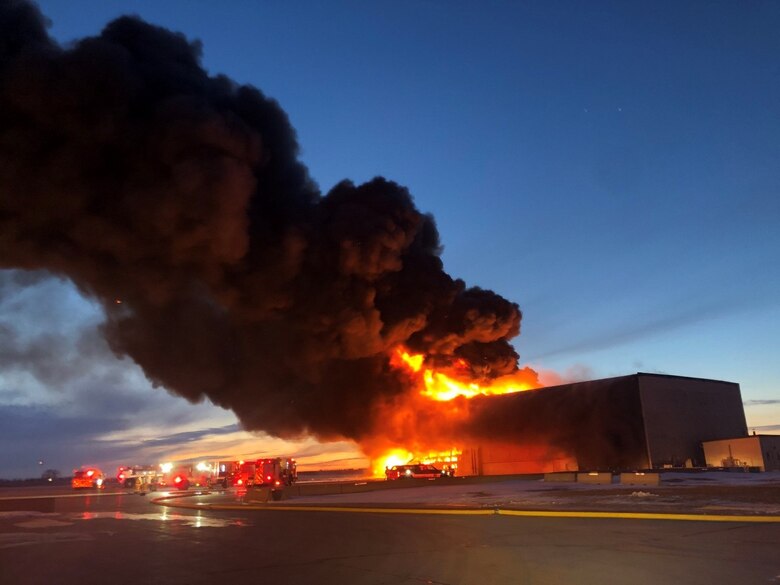The Office of Special Investigations' unwavering commitment to thorough investigations met the challenges of COVID-19 in North Dakota, by scouring the charred remains of a Strategic Air Command era aircraft hangar.
Members of OSI Detachment 813, joined by 2nd Field Investigations Squadron Forensic Science Consultant Special Agent Drew Weinzierl, worked through sub-zero temperatures and mid-March snows at Minot Air Force Base, North Dakota, looking for any evidence of what caused the hangar to catch fire shortly before New Year's Eve last year.
Back on Dec. 28, 2019, SA Leonard Meadows, Det. 813 Superintendent, and SA Courtney Fleming were returning from the town of Minot when they noticed black smoke billowing from the base. They found the base fire department battling a large blaze on the flight line. The two agents gathered what information they could and phoned their local FSC team at Buckley AFB, Colorado.
"Once word of the fire spread across the command, I responded to Minot and worked with the detachment to identify and preserve key evidence from the scene," SA Weinzierl said. "We realized the situation was far more complex than OSI could handle alone, so we reached out to the local Bureau of Alcohol, Tobacco, Firearms and Explosives office in Bismarck, (North Dakota), for assistance."
For the next four days, ATF and OSI teamed up to document and process the nearly 22,000 square foot hangar and its contents, which included two of Minot AFB's new airfield snow blowers, delivered the week prior to the fire, and valued at more than $600,000 each.
As the investigation progressed, ATF and OSI Agents decided the partially collapsed building would have to be demolished in order to safely continue processing the scene and locating evidence.
"SA Meadows spent the next two months leveraging his relationships across the base to establish a plan to preserve evidence, maintain an active and safe flight line and run a thorough joint investigation with ATF," SA Weinzierl said.
Fast forward to March 2020. After two months of coordination, a $3 million demolitions contract was awarded. SA Meadows secured five days during contract execution that allowed for ATF and OSI to work alongside demolition contractors to complete the scene processing.
However, in the week leading up to the hangar being demolished, the U.S. began to feel the effects of COVID-19. On March 13, 2020, in response to those effects, Secretary of Defense Dr. Mark T. Esper ordered travel restrictions that nearly brought the case to an abrupt end.
Plus, Minot base leadership, needing to maintain a safe and foreign object damage-free flight line, could not risk mission effectiveness to have the building remain any longer.
"Knowing they would have to act fast, OSI leadership allowed me to return to Minot to preserve evidence that would otherwise be lost for good," SA Weinzierl said. "So, coordinating with Det. 813 and ATF, I returned to the scene to finish the job we had all started two months earlier."
The investigation didn't end there.
SA Weinzierl assessed and documented the scene after the contractor removed the structural components of the building.
"I realized this was not going to be a one, or even two day job," he recalled.
Then there was the challenging Minot area weather. High temperatures for the week were in the 20's with plenty of snow. Another complication found all ATF personnel on a travel hold and would not be able to respond to the scene. Despite less than ideal weather and personnel shortages due to COVID-19 concerns, the team forged ahead.
For the next five days, utilizing video teleconferencing to coordinate with the grounded ATF personnel, SAs Meadows and Weinzierl, and Investigator Jesse Gomez of Det. 813, located and preserved key evidence, including the two 30,000 pound snow blowers. They captured scene conditions to establish a basis for determining the origin and cause of the fire resulting in a $7 million loss to the Air Force.
The case remains under investigation pending further processing and analysis of the evidence by ATF.

On Dec. 28, 2019, a fire gutted this Strategic Air Command-era hangar on Minot Air Force Base, N.D. Office of Special Investigations Detachment 813 and 2nd Field Investigations Squadron teamed with the Bureau of Alcohol, Tobacco, Firearms and Explosives to conduct the subsequent investigation to determine the origin and cause of the blaze resulting in a $7 million loss to the Air Force. (U.S. Air Force courtesy photo)






